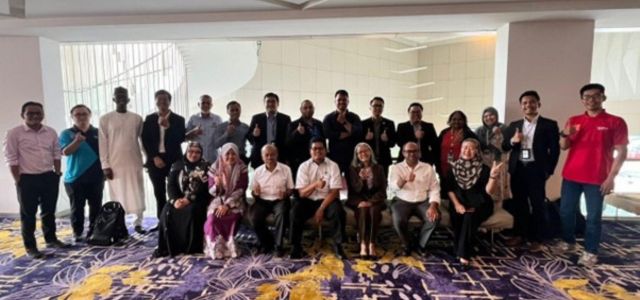Global Water Partnership (GWP) Southeast Asia has facilitated Indonesia, Malaysia, Viet Nam and the Philippines through the Support Program in conducting a stakeholder consultation for the 2023 reporting cycle. Among the countries in the region that have submitted the report is Malaysia.
With the support from GWP Malaysia, the first stakeholder consultation workshop was held on 13 July 2023. Participation was mainly by the Department of Irrigation and Drainage Malaysia (DID) officers representing their various divisions. The workshop was conducted in a hybrid mode, physically at the DID office in Ampang, Kuala Lumpur and online participation was from the various states in Peninsular Malaysia, Sabah and Sarawak. The facilitator had briefed the workshop participants on SDG indicator 6.5.1 Survey and the 2020 report. This was followed by an overview of the survey form and the facilitator went through each question and requested the participants to provide their responses via a Google form created, to ease the collection of data and the survey process.
The second stakeholder workshop was held on 15 August 2023 at Everly Hotel, Putrajaya; also in hybrid mode. The DID sent out invitation letters to about 50 organisations including government agencies, private sectors and CSOs. Total participants who joined the workshop were about 42 persons, 16 persons joined physically and another 26 persons were online via Google Meet. The same process as with the first workshop was conducted.
The third workshop was conducted on 19 September 2023, Grand Barakah Hotel, Ampang to review the prepared draft survey form and to determine the scoring. The draft scored survey form was submitted to the National Focal Point (NFP) by the facilitator on 20 September 2023. Following this, the scored survey form was disseminated to related stakeholders to provide their feedback. The final draft survey form was submitted to the NFP on 25 October 2023, after updating the feedback from stakeholders and remarks from the CWP.
The facilitator with his team had conducted 4 internal workshops to compile, review and search for additional documents to verify the statement submitted by the stakeholders. This is to ensure that the information provided is supported by the evidence.
Refinement of the draft final survey was carried out in a working meeting on 23rd October 2023, before being submitted to the Ministry of Natural Resources, Environment and Climate Change Malaysia (NRECC) on 26 October 2023 for endorsement.
The outcome of the consultation process and the final score, indicated that Malaysia is dedicated to achieving implementation of Integrated Water Resources Management (IWRM) by 2030, with notable progress outlined in the Twelfth Malaysia Plan (RMK12). Malaysia's IWRM efforts are reinforced by a complex legislative framework, comprising 45 policies, 74 Acts, and 70 state enactments or ordinances that impact the water sector. The Water Sector Transformation (WST) 2040 initiative, managed by the Prime Minister's Office, aims to revitalise the water sector. Its objectives include contributing to the national GDP, providing affordable high-quality water, generating employment, and supporting advancements in Science, Technology, Innovation, and Engineering (STIE) and Research, Development, Innovation, and Commercialization (RDIC). Key strategies include empowering the public's role, enhancing governance, data-driven decision-making, sustainable financing, and infrastructure development.
There are various Federal Ministries involved in the governance of water, not specific to IWRM, but encompasses aspects related to IWRM, and they sit in the National Water Council (NWC). The States are represented in the NWC, as well. There are also several committees, task forces and working groups looking at the different aspects of water resources planning and development, for example, at State government level, the Department of Irrigation and Drainage (DID) Malaysia has formed Integrated River Basin Management (IRBM) Task Forces. The DID also runs the National Water Balance Management System (NAWABS), which aims to assist and support water resources management in the river basin more efficiently through an updated and state-of-the-art operational management and planning tool. In addition, The Department of Environment (DOE) in Malaysia plays a significant role in environmental protection and management, including functions related to water resources. Several agencies are undertaking management instruments such as long-term monitoring of water, and related hydrological data, addressing data and information on water quantity and quality, in various formats, which are accessible.
However, the present arrangement for data custodianship and management is spread amongst various stakeholders, and there is a need for a collective monitoring system and data collection, to enable a more comprehensive view of the state of water availability. The financial support by the federal government should be strategized to cover the full spectrum of the acceleration strategies to be adopted for the implementation of IWRM which include; empowering people, strengthening governance at all levels, enhancing capability in data-driven decision making, ensuring sustainable financing and developing sustainable infrastructure with cost-effective technology. As a future moving forward, the financial support must not be in a single direction such as on infrastructure and to focus on accountability reporting to be made available.
